Universal Basic Income is no longer a fringe idea. It’s a serious, necessary response to South Africa’s deep inequality, unemployment, and broken safety nets. It’s also a simple truth: everyone deserves the basics.
Universal basic income. No one left behind.
A Universal Basic Income (UBI) is a regular cash transfer available to all working-age adults, with no conditions, no complex qualifications, and no one left behind.
It’s:
- Universal: It’s available to everyone, regardless of employment status or income.
- Basic: It’s enough to meet essential needs and support dignity.
- Income: It’s regular and reliable, not a once-off.
UBI recognises that poverty is not a personal failure, it’s a policy failure. This is a solution that centres people, not paperwork.
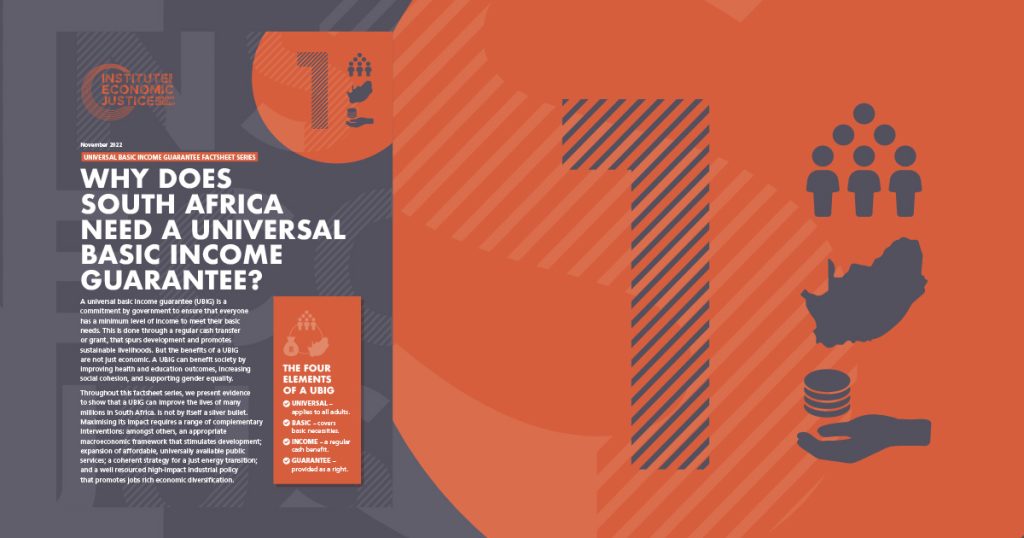
Learn the basics of UBI in Fact Sheet #1
UBI strengthens the economy and creates jobs.
A universal basic income is affordable in our country.
By spending money on UBI, the government is creating more money in the economy. That’s because the people who receive the UBI spend it on basic goods and services in their local areas. This helps to boost businesses and create jobs, and enables more people to look for work or enter paid work.
Right now, poverty is holding millions of people back from realising their potential to create, contribute, and serve their communities. Many people in poverty simply don’t have enough money to even search for a job or pay for transport to get to work. By giving every working-age adult a secure income floor, UBI helps people move from survival mode into productive employment and entrepreneurship.
The answer is really simple: Helping people escape poverty is good for the overall economy and for job creation.
The government would recoup up to 50% of what is spent on a UBI through tax on the increased economic activity, including VAT and income tax. The remainder of the cost of the UBI should be borne by the richest in our society, through a wealth tax or other taxes.
The idea is that if you happen to be doing well, you can still receive the UBI, but you contribute more in taxes than you get in UBI payments. If you happen to fall on hard times, the UBI is there to cushion the fall and make sure you can meet your basic needs, and the cost is covered by others who are doing well.
It’s a much fairer, more dignified way of providing support compared to the system we have now, where people in poverty have to jump through hoops to prove their struggle to the government based on arbitrary criteria in order to access assistance, and many are unable to and so slip through the cracks.
It is important to make sure a UBI is introduced in a way that is responsible and sustainable for the national budget. We can do that by phasing it in. If the payments are made available to the poorest communities first, and broadened over a few years to reach universality, the economic benefits of the UBI will have time to kick in, to offset the costs. Expanding social protection in this manner is possible even in the poorest countries.
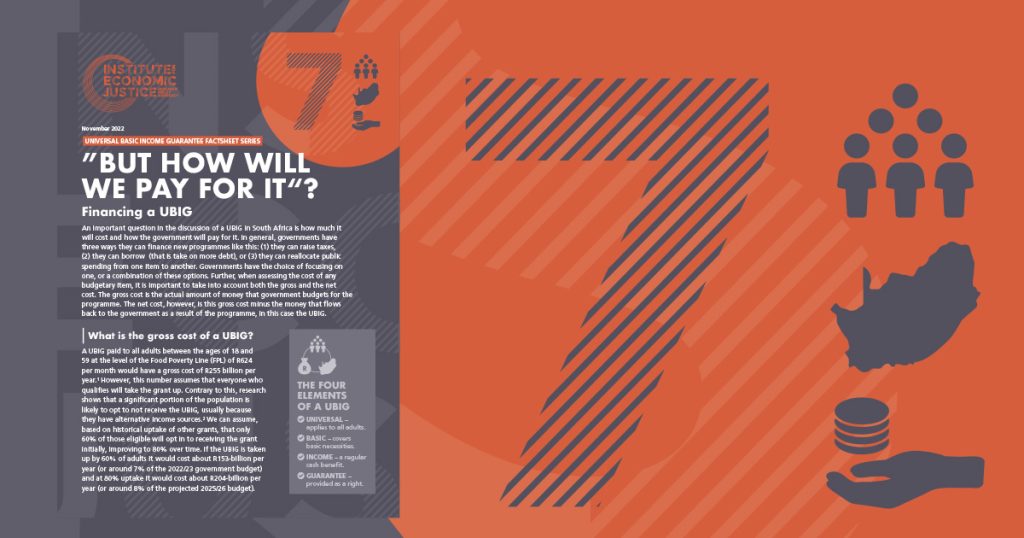
See the affordability explained in Fact Sheet #7
UBI is not just affordable, it’s effective. Studies from Namibia, Kenya, Zambia, and Mexico and many other places show that basic income helps people invest in businesses, improve their income, and build long-term stability. Many recipients start small enterprises or enter into paid work.
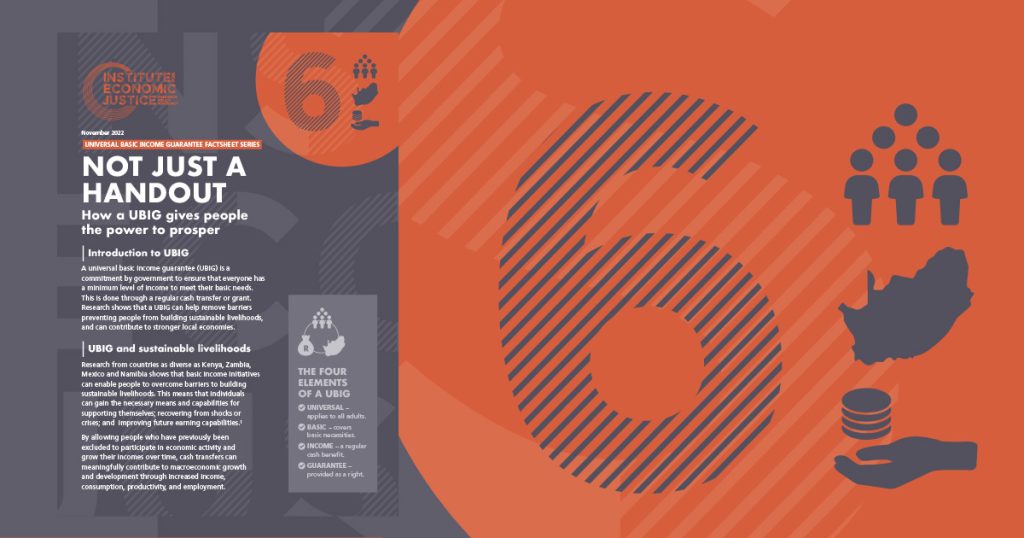
Explore the evidence in Fact Sheet #6
This. Isn’t. Working.
It’s time to try UBI.
The current system leaves millions behind
South Africa’s social relief of distress (SRD) grant helped show the potential of income support, but also its limits. At R370/month, it falls far below the food poverty line(the minimum amount required for a person to get enough to eat if they spend everything they have on food). Worse still, only a fraction of eligible people receive it.
Research shows that the current system is riddled with exclusion, red tape, and arbitrary barriers. Nearly nine out of ten exclusions from the grant are wrongful exclusions..
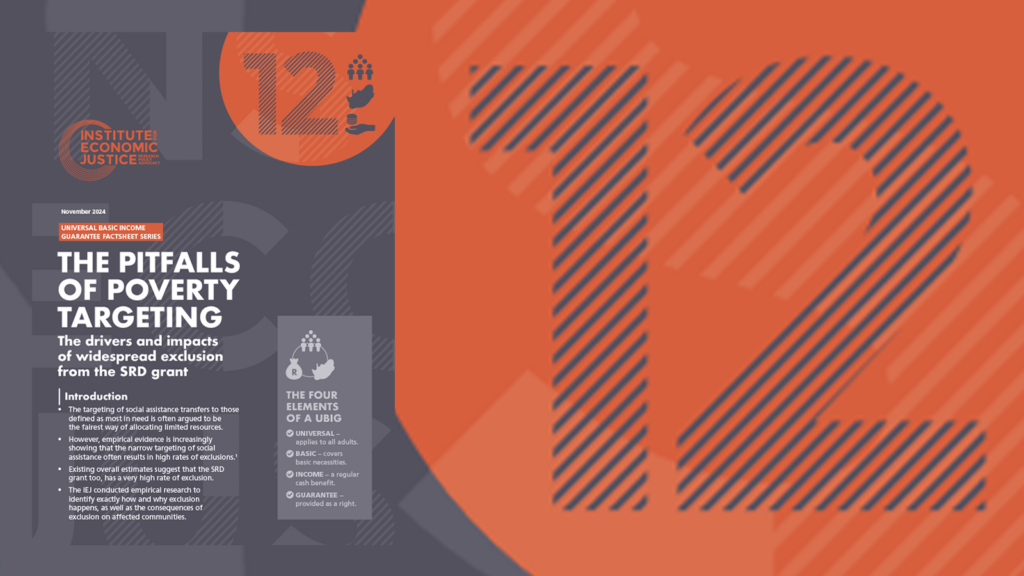
Read Fact Sheet #12 to understand how targeting creates exclusion
The result is that around 10 million people living in food poverty are unable to access any assistance from the government. That has to change. Some economists and politicians like to say that once the economy grows, we can fix hunger. But that gets it backwards. We have to fix hunger first.
South Africa is a hungry child. We cannot learn or grow if we are hungry. It is only after we are nourished that we can realise our potential.
We need something better. We need a system that does not filter people out, but lifts everyone up. That’s what UBI does.
Universal Basic Income for all. Because no one should be left behind.
Too often, social grants are designed only for the “deserving poor”, those who can prove their struggle. But this model creates barriers, stigma, and constant uncertainty. Proving your struggle based on narrow criteria can be very difficult, and it is hardest for those who are struggling the most.
UBI removes those obstacles.
- It supports full-time moms.
- It supports entrepreneurs and informal traders.
- It helps students focus on their studies.
- It serves as a safety net for all of us, because anyone can fall on hard times.
This is not charity. It’s common sense…
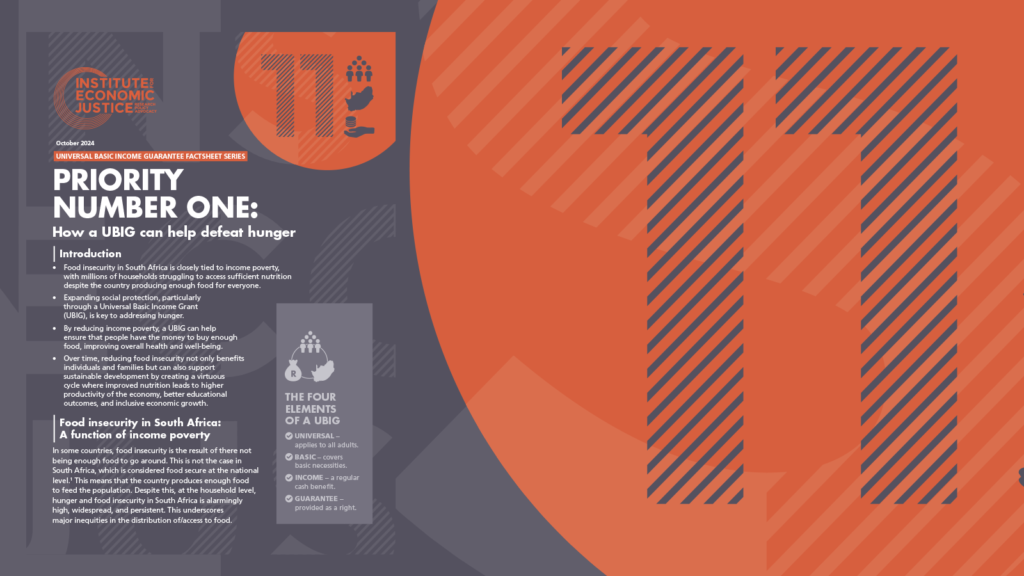
Read about the power of universality in Fact Sheet #11
South Africa’s future is brighter with UBI
We’re often told to wait. To spend what little we have looking for a job that doesn’t exist. To survive on nothing.
But UBI flips the script. It says: We trust people. We believe in people. We invest in people.
South Africa is rich in potential, in talent, creativity, and resources, but we need to build a system that shares those resources more fairly. A system where every working-age adult has a foundation to build a life of dignity.
Universal Basic Income. No one left behind.
It’s time to build a system that lifts everyone up.
Explore more:

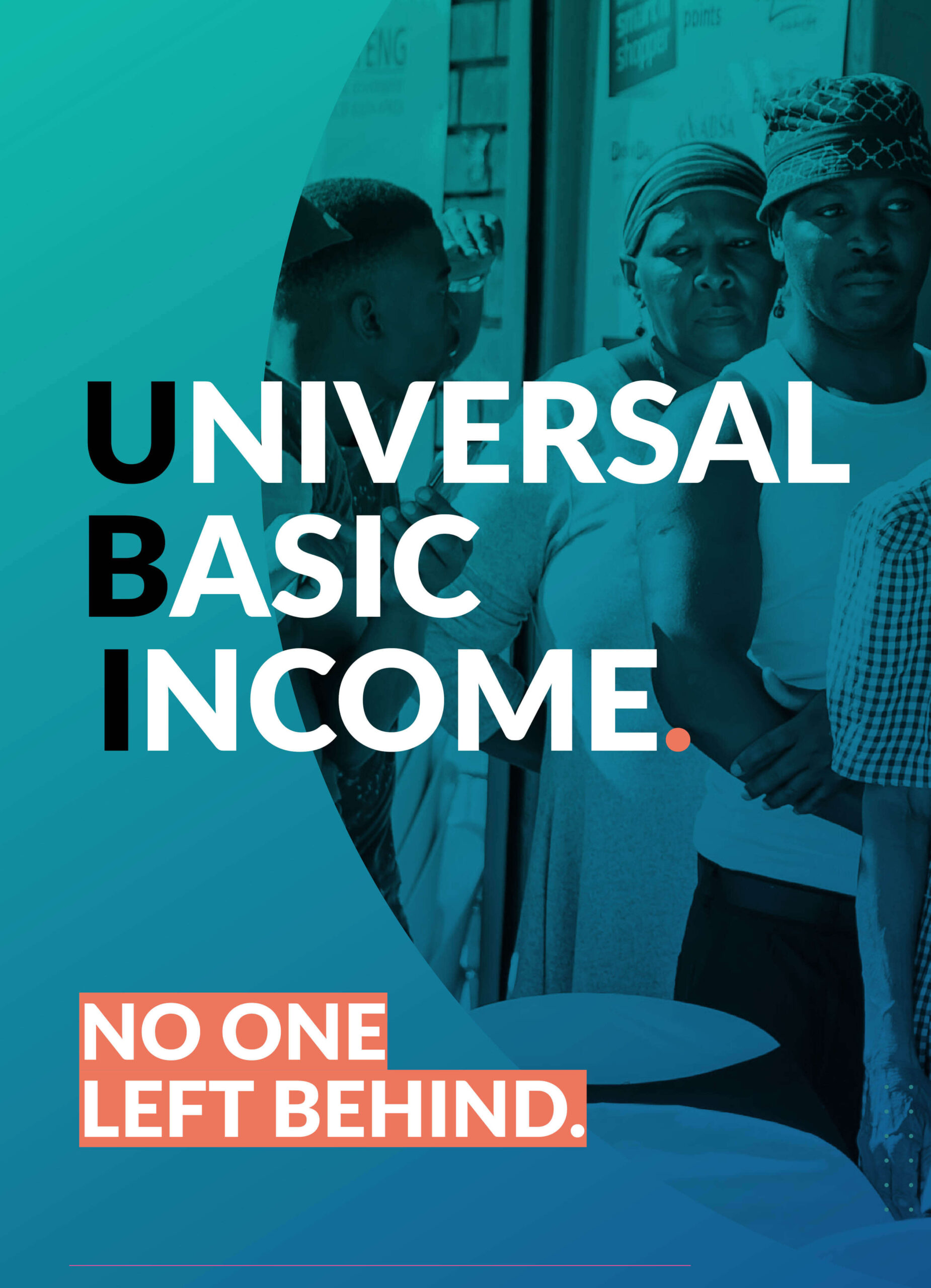
 Amaarah is a Junior Programme Officer in the Rethinking Economics for Africa project. She is currently studying towards her Masters in Applied Development Economics at Wits University.
Amaarah is a Junior Programme Officer in the Rethinking Economics for Africa project. She is currently studying towards her Masters in Applied Development Economics at Wits University.  Dr James Musonda is the Senior Researcher on the Just Energy Transition at the IEJ. He is also the Principal Investigator for the Just Energy Transition: Localisation, Decent Work, SMMEs, and Sustainable Livelihoods project, covering South Africa, Ghana, and Kenya.
Dr James Musonda is the Senior Researcher on the Just Energy Transition at the IEJ. He is also the Principal Investigator for the Just Energy Transition: Localisation, Decent Work, SMMEs, and Sustainable Livelihoods project, covering South Africa, Ghana, and Kenya. Dr Basani Baloyi is a Co-Programme Director at the IEJ. She is a feminist, development economist and activist. She gained her research experience while working on industrial policy issues in academia, at the Centre For Competition, Regulation and Economic Development (CCRED) and Corporate Strategy and Industrial Development (CSID) Unit.
Dr Basani Baloyi is a Co-Programme Director at the IEJ. She is a feminist, development economist and activist. She gained her research experience while working on industrial policy issues in academia, at the Centre For Competition, Regulation and Economic Development (CCRED) and Corporate Strategy and Industrial Development (CSID) Unit. Dr Andrew Bennie is Senior Researcher in Climate Policy and Food Systems at the IEJ. He has extensive background in academic and civil society research, organising, and activism. Andrew has an MA in Development and Environmental Sociology, and a PhD in Sociology on food politics, the agrarian question, and collective action in South Africa, both from the University of the Witwatersrand.
Dr Andrew Bennie is Senior Researcher in Climate Policy and Food Systems at the IEJ. He has extensive background in academic and civil society research, organising, and activism. Andrew has an MA in Development and Environmental Sociology, and a PhD in Sociology on food politics, the agrarian question, and collective action in South Africa, both from the University of the Witwatersrand. Juhi holds a Bachelor of Arts degree in International Relations and Sociology from Wits University and an Honours degree in Development Studies from the University of Cape Town. Her current research focus is on social care regimes in the South African context, with a particular focus on state responses to Early Childhood Development and Long-Term Care for older persons during the COVID-19 pandemic. Her other research areas include feminist economics, worlds of work and the care economy.
Juhi holds a Bachelor of Arts degree in International Relations and Sociology from Wits University and an Honours degree in Development Studies from the University of Cape Town. Her current research focus is on social care regimes in the South African context, with a particular focus on state responses to Early Childhood Development and Long-Term Care for older persons during the COVID-19 pandemic. Her other research areas include feminist economics, worlds of work and the care economy. Bandile Ngidi is the Programme Officer for Rethinking Economics for Africa. Bandile has previously worked at the National Minimum Wage Research Initiative and Oxfam South Africa. He holds a Masters in Development Theory and Policy from Wits University. He joined the IEJ in August 2018. Bandile is currently working on incubating the Rethinking Economics for Africa movement (working with students, academics and broader civil society).
Bandile Ngidi is the Programme Officer for Rethinking Economics for Africa. Bandile has previously worked at the National Minimum Wage Research Initiative and Oxfam South Africa. He holds a Masters in Development Theory and Policy from Wits University. He joined the IEJ in August 2018. Bandile is currently working on incubating the Rethinking Economics for Africa movement (working with students, academics and broader civil society).  Liso Mdutyana has a BCom in Philosophy and Economics, an Honours in Applied Development Economics, and a Masters in Applied Development Economics from Wits University. His areas of interest include political economy, labour markets, technology and work, and industrial policy. Through his work Liso aims to show the possibility and necessity of economic development that prioritises human wellbeing for everyone.
Liso Mdutyana has a BCom in Philosophy and Economics, an Honours in Applied Development Economics, and a Masters in Applied Development Economics from Wits University. His areas of interest include political economy, labour markets, technology and work, and industrial policy. Through his work Liso aims to show the possibility and necessity of economic development that prioritises human wellbeing for everyone. Joan Stott holds a Bachelor of Business Science in Economics and a Master’s in Economics from Rhodes University. She brings to the IEJ a wealth of experience in public finance management, policy development, institutional capacity-building, and advancing socioeconomic and fiscal justice.
Joan Stott holds a Bachelor of Business Science in Economics and a Master’s in Economics from Rhodes University. She brings to the IEJ a wealth of experience in public finance management, policy development, institutional capacity-building, and advancing socioeconomic and fiscal justice. Siyanda Baduza is a Junior Basic Income Researcher at IEJ. He holds a BSc in Economics and Mathematics, an Honours degree in Applied Development Economics, and is currently completing a Master’s degree in Applied Development Economics at the University of the Witwatersrand. Siyanda’s research focuses on the impacts of social grants on wellbeing, with a particular focus on the gendered dynamics of this impact. His interests include applied micro-economics, policy impact evaluation, labour markets, gender economics, and political economy. He is passionate about translating economic research into impactful policy.
Siyanda Baduza is a Junior Basic Income Researcher at IEJ. He holds a BSc in Economics and Mathematics, an Honours degree in Applied Development Economics, and is currently completing a Master’s degree in Applied Development Economics at the University of the Witwatersrand. Siyanda’s research focuses on the impacts of social grants on wellbeing, with a particular focus on the gendered dynamics of this impact. His interests include applied micro-economics, policy impact evaluation, labour markets, gender economics, and political economy. He is passionate about translating economic research into impactful policy. Shikwane is a Junior Programme Officer at IEJ focusing on civil society support and global governance in the G20. He has a background in legal compliance, IT contracting and student activism. He holds degrees in Political Studies and International Relations, as well as an LLB, from the University of the Witwatersrand.
Shikwane is a Junior Programme Officer at IEJ focusing on civil society support and global governance in the G20. He has a background in legal compliance, IT contracting and student activism. He holds degrees in Political Studies and International Relations, as well as an LLB, from the University of the Witwatersrand. Dr Tsega is a Senior Researcher focusing on Women’s Economic Empowerment within the G20. She examines gender equity in economic policy, with expertise in food systems and small enterprise development. She holds a PhD in development studies from the University of the Western Cape, an MA in Development Economics, and degrees in Development Studies and Economics from UNISA and Addis Ababa University.
Dr Tsega is a Senior Researcher focusing on Women’s Economic Empowerment within the G20. She examines gender equity in economic policy, with expertise in food systems and small enterprise development. She holds a PhD in development studies from the University of the Western Cape, an MA in Development Economics, and degrees in Development Studies and Economics from UNISA and Addis Ababa University. Nerissa is a G20 Junior Researcher at IEJ, focusing on advancing civil society priorities within the G20 framework. She bridges data, research, and policy to advance inclusive economic frameworks. She is completing a Master’s in Data Science (e-Science) at the University of the Witwatersrand, and holds Honours and Bachelor’s Degrees in International Relations with distinction. She has worked as a Research Fellow at SAIIA and a Visiting Research Fellow at Ipea in Brazil.
Nerissa is a G20 Junior Researcher at IEJ, focusing on advancing civil society priorities within the G20 framework. She bridges data, research, and policy to advance inclusive economic frameworks. She is completing a Master’s in Data Science (e-Science) at the University of the Witwatersrand, and holds Honours and Bachelor’s Degrees in International Relations with distinction. She has worked as a Research Fellow at SAIIA and a Visiting Research Fellow at Ipea in Brazil. Dr Mzwanele is a Senior Researcher supporting South Africa’s G20 Sherpa with policy research. He holds a PhD in Economics from the University of Birmingham and an MSc from the University of the Witwatersrand. His work covers open macroeconomics, trade, finance, and higher education policy, and he has published widely on inequality, unemployment, household debt and higher education curriculum reform.
Dr Mzwanele is a Senior Researcher supporting South Africa’s G20 Sherpa with policy research. He holds a PhD in Economics from the University of Birmingham and an MSc from the University of the Witwatersrand. His work covers open macroeconomics, trade, finance, and higher education policy, and he has published widely on inequality, unemployment, household debt and higher education curriculum reform. Kamal is the Project Lead for IEJ’s G20 work, focusing on sovereign debt and development finance. He holds a BComm (Hons) in Applied Development Economics from the University of the Witwatersrand and an Erasmus Mundus Joint Masters in Economic Policies for the Global Transition. He has worked with SCIS, UNCTAD and co-founded Rethinking Economics for Africa.
Kamal is the Project Lead for IEJ’s G20 work, focusing on sovereign debt and development finance. He holds a BComm (Hons) in Applied Development Economics from the University of the Witwatersrand and an Erasmus Mundus Joint Masters in Economic Policies for the Global Transition. He has worked with SCIS, UNCTAD and co-founded Rethinking Economics for Africa.